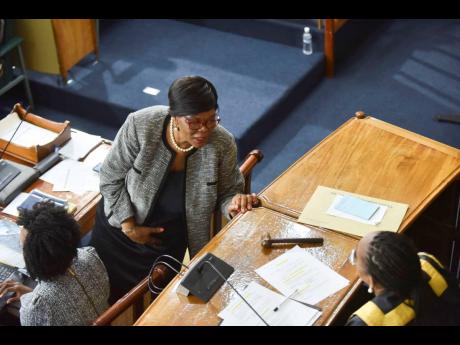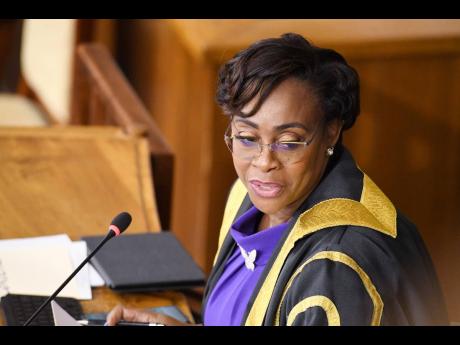Editorial | Speaker blunders … again
Juliet Holness’ continued obduracy in refusing to release Attorney General Dr Derrick McKoy’s opinion on procedures for tabling reports by the auditor general (AuG) in Parliament is, to say the least, puzzling.
So, too, was her seeming attempt to throw under the bus, or extract retribution from, the clerk to Parliament, Valrie Curtis, for the public relations and administrative fiasco into which this matter has evolved. Ms Curtis, however, is to be commended for the equanimity and professionalism with which she conducted herself in the House on Tuesday, when she might have been seething.
Whatever the final outcomes of any discussion between the Speaker and the clerk, or other disciplinary hearing, Mrs Holness should offer a public apology to Ms Curtis for her clunky handling of the matter, in which she publicly censured the official without due process in accordance with civil service regulations. That action was ironic, given Parliament’s continued insistence on the gag clause that requires the Integrity Commission (IC) not to speak about its investigations until the probes are completed and reports are tabled in Parliament,
Last November, Mrs Holness ruled that reports by the AuG on public bodies had to wait for two months before being tabled, to allow relevant ministers time to comment on them, in accordance with the Financial Administration and Audit Act and the Public Bodies Management and Accountability Act.
Last week, two reports from the auditor general, Pamela Monroe Ellis, submitted to Parliament last December and in January, were returned to the AuG, who promptly sent them back. It may be that Ms Monroe Ellis received a legal opinion that asserts her constitutional obligations to remit reports to Parliament over the requirements of any other legislation.
NOT A PRIVATE MATTER
On Tuesday, Speaker Holness conceded that “there continues to be dissonance in the interpretation of the law on how reports of public bodies should be tabled”.
Yet, while touting her release of an opinion on the matter by the Parliament that supports the position she adopted, the Speaker refused to budge on making public the one by Dr McKoy, though insisting that “there is nothing to hide”.
On the face of it, Mrs Holness stands only on hubris if indeed her only reason for withholding Dr McKoy’s opinion is that “it is the Speaker’s discretion to make a ruling having taken into consideration all opinions received”.
This is not a private matter. Parliament and the public have an interest in knowing the basis upon which the parliamentary counsel’s opinion is preferred over that of the attorney general, if they indeed differ.
Further, if the Speaker holds, as she clearly does, that her position is right, she not only breached a principle, but her own ruling, by tabling the two reports sent back to Parliament by the auditor general, while planning to negotiate with Ms Monroe Ellis on the issue. Mrs Holness said she took that position because the House won’t convene for a month. What happens after that if the auditor general doesn’t relent?
PUBLIC APOLOGY
Having created this precedent, it would be sensible if the Speaker rescinds her ruling and returns to the old system for tabling these reports, while causing the constitutional and legislative questions to be adjudicated by the courts.
With respect to the matter of the clerk to Parliament, Ms Curtis is seemingly being blamed for allowing physical reports from the AuG to remain at Parliament in the face of what might have been interpreted as Ms Monroe Ellis’ defiance of the Speaker’s November ruling. Perhaps it was expected that Ms Curtis would send them back. This, although it is not clear from Speaker Holness’ letter to Ms Curtis specifically what the official did, or failed to do.
However, in that letter, distributed to all MPs, Ms Holness declared her actions to be “a gross dereliction of duty” that had brought Parliament “into disrepute”.
But, apparently, the Speaker arrived at these positions, which she made public, in the absence of a hearing and without following civil service disciplinary regulations. For that, Mrs Holness should not only deliver a mea culpa, but offer Ms Curtis a public apology.


